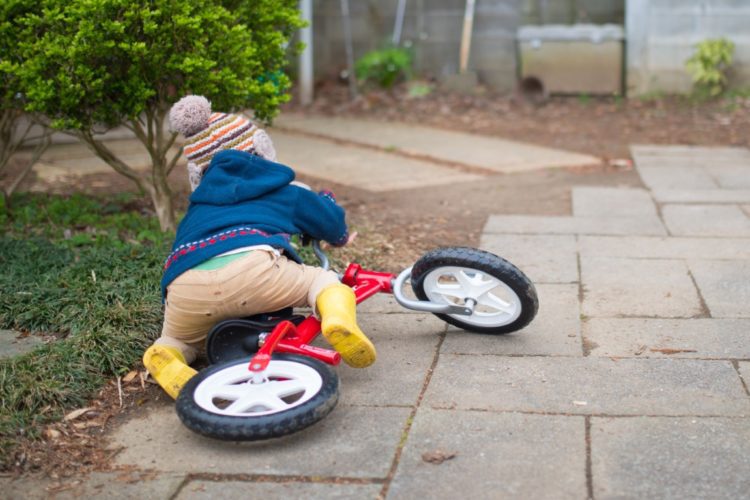Building Resilience, Essential Kids Blog
Let your kids fail often. It’s just good parenting.

It is perfectly natural for parents to want to protect their beloved children and keep them safe – heck it’s a deep biological drive.
Over time the social norms and expectations around children have softened and together with fear-based 24/7 news cycles and the fear of litigation parents have become increasingly vigilant.
One of the shifts that has occurred is the need to protect kids from failing.
We seem less inclined to allow kids to explore and navigate their world without close supervision because they will make poor choices and possibly a mess!
Young children especially are wired to explore, question and discover through their senses the wonder of life and often that may be perceived as a ‘mistake’.
Take the unravelling of toilet rolls – a fascinating exploration that explores many scientific hypotheses including gravity.
Then there is emptying drawers of clothes, linen, plastics and anything they can find to practise emptying.
These are all developmentally normal experiences not a sign of poor parenting or a naughty child.
Technically, these small attempts could be seen as moments of failure. However, little kids are pretty cute and indeed many of these acts may be signs of potential toddler genius.
From explorer to failure
However, something happens as our toddlers head towards the test-driven schooling system. Their attempts get labelled as mistakes. This term – which may have come from early archery meaning a ‘miss take’ where an arrow misses its target – becomes more sinister.
So often children making mistakes and failing seems to become a reflection on one’s parents rather than a normal part of childhood.
Kids are kids, prone to making poor choices – dropping things, drawing on the wrong things with permanent marker, being selfish and struggling to share, having meltdowns, falling over, and having bumps and bruises while playing freely.
This is totally normal and every moment can help build your child’s capacity to overcome small mistakes and setbacks.
The gift of resilience
This helps build the important gift of resilience – something that has declined in recent times.
When children are protected from failing or being disappointed – regardless if this comes from a place of love – it will come at a cost later in life when a moment of challenge or setback arrives (and it will).
I often pinpoint the moment that the rules to pass-the-parcel changed as being a huge turn in the wrong direction to overprotecting kids from setbacks.
Suddenly, instead of having only one winner in this party game, it became “everyone gets a prize!”
This well-intentioned action, aimed at protecting kids from being disappointed, has meant many children have seldom experienced disappointment.
Learning what it feels like to lose or not get what you want is a part of becoming emotionally competent.
To become emotionally buoyant we need to experience emotionally challenging moments, especially when we are younger before the limbic brain grows to be more influential.
Returning pass the parcel back to its rightful position in early childhood – in a fun party environment – gives our kids a chance to know that while disappointment sucks – it is something we can learn to navigate with experience.
Learning about losing and being disappointed when you sit for your first NAPLAN test has seen many students struggling with unnecessary stress and anxiety –some returning to bedwetting, having nightmares, vomiting or even pulling eye lashes out.
The only way to learn this incredibly important skill is by experiencing failure and leaning that it’s not a sign we are defective, broken or wrong – we just made a poor choice or were unlucky.
Sadly no app will give our child this valuable learning.
Learning to lose well
The only way we can learn it is by losing and failing – over and over. Professor Carol Dweck in her book, Mindset, explores the difference between flexible and fixed mindsets and she encourages teaching our children that making mistakes and meeting the challenge of addressing failure are important.
Kids need to play lots of games with others to learn about losing and winning – well. No-one ever enjoys losing or failing, however we can learn to manage it better.
It is important that we validate the big ugly feelings that can come with feeling disappointed – and also encourage ways to soothe it.
Simple card games and board games are a great starting point. As kids get older there’s always hide and seek, beach cricket, tag, chasey and even good old noughts and crosses! Even experiences like flying kites can have valuable learning experiences because kites are notoriously badly behaved.
Finally, nothing helps kids build resilience around failing better than playing often in Mother Nature – the unpredictability of nature lends itself to many moments of failure.
Learning about the art of taking risks and recovering is not only exciting, it helps build confidence and courage.
So please let your kids fail – it may be one of the most important parenting decisions you ever make.
Image credit: ©️ hakase420 /Adobe Stock – stock.adobe.com



